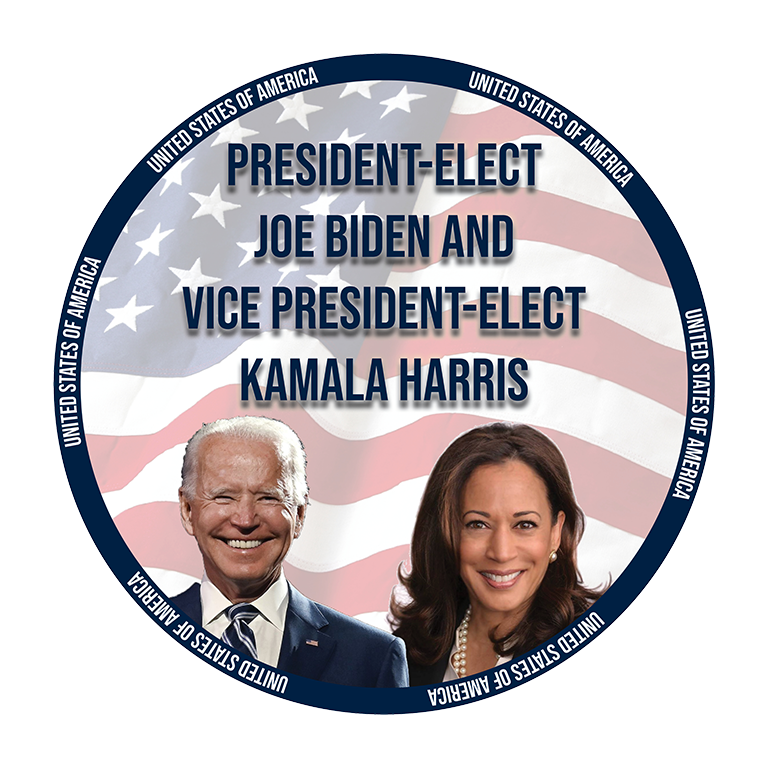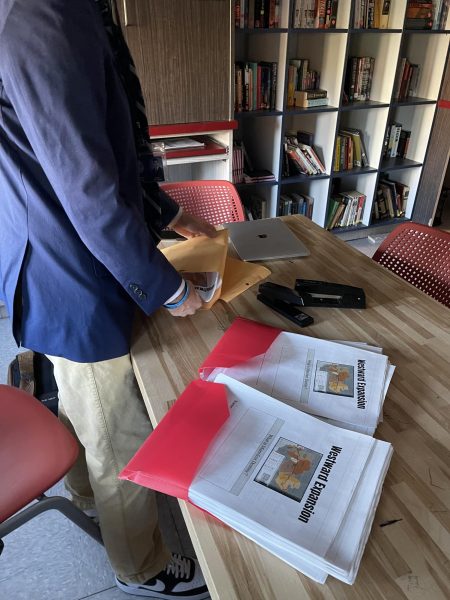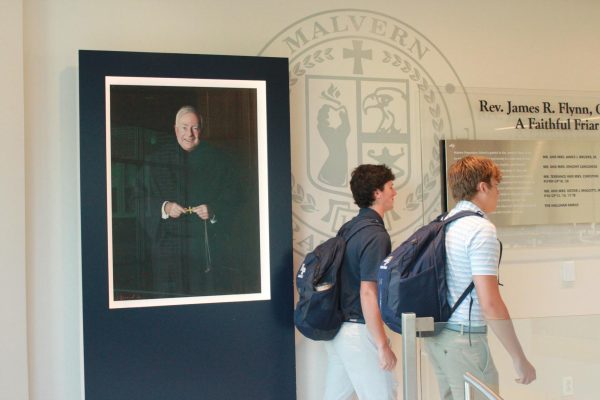Joe Biden Elected 46th President of the United States
Malvern teachers discuss what this result means for Malvern and the country as a whole.
Though a controversial election, Biden pulled ahead with 306 electoral votes, winning by six million in the popular vote. There were also milestones in voting numbers and many firsts for the elected vice president.
There have been numerous lawsuits filed on behalf of the Trump campaign, challenging the validity of mail-in-ballots. At this time, all lawsuits have been dismissed due to lack of evidence. Ms. Danielle Suber, Malvern’s Director of Diversity, Equity, and Inclusion discusses her take on the legitimacy of the election.
“I actually liked the process of mail-in ballots personally. As we do post mortem of this election, we’re hearing that it was one of the most secure elections in quite some time.”
Another controversial part of the election was the debate of whether or not the request for recounts were legitimate. Suber believes Arizona has a good system that should be implemented throughout the entire country.
“I love the fact that Arizona has a policy where no recounts happen unless the difference, I believe, is less than 5%,” she said. “That’s a nice standard, I think across the country we could use.”
Suber hopes that the voting process will become more universally similar within each state.
“The reason why things are so messy and murky right now is that each state is kind of governing their own voting process. Maybe unilaterally, we can make some changes and adjustments that would make it fair and equitable for everybody,” Suber said.
The debate of the effectiveness of the electoral college has also become a popular topic. Some people believe the current process makes certain people’s votes matter more than others.
“I think the electoral college was designed for a point in time in our country that we are no longer at. If we decide to keep the electoral college. I think there’s a lot of redistribution, perhaps of electoral votes, and really assessing the system in which we decide how many states get votes to make sure it’s equitable,” Suber said.
Suber hosted another Courageous Conversation a few days after the election, when the results were still undecided. She believed it was important for the students and faculty to have an outlet to express how they feel.
“What I love about Malvern is that we create such an inclusive learning environment, so I wanted the learning to continue to happen in the classroom, and then provide another outlet for students, faculty, and staff to talk about their feelings and emotions,” Suber said.
Joe Biden will be the second Catholic President in United States history. The legitimacy of his faith is questioned by some voters who think he does not hold true Catholic values. Suber is interested in seeing if Joe Biden will stand by the Catholic Principles.
“I think it’s something that the Malvern Community can take a look and kind of make sure that President Biden is going to uphold the principles of the faith,” Suber said. “I think that if he has declared himself as being a Catholic and he believes in those principles, we can hold him accountable for that and really look for some integrity out of the leadership of the President.”
Kamala Harris also made history, being elected the first black, South Asian, and Indian Vice President in the United States. Suber believes this is a great accomplishment, especially for women of color.
“I think she’s given this new hope and resurgence to people of color, especially women of color, that they can aspire to even make it to the highest office of our government, which is awesome,” she said.
Suber remembered an encounter Harris had with her nieces that was really imprinted in her mind.
“I love the speech that she did to little girls to kind of tell them ‘you can be anything you want to be.’ I remember that one moment, she had to sit there with her niece’s where they were saying ‘I want to be president, but I don’t think I can.’ She kind of interrupted that and was like, ‘of course you could be the President,’” Suber said.
The COVID-19 pandemic was at the forefront of most voters’ minds when entering the voting booths. Suber acknowledges that handling the pandemic is very important and is hopeful for Joe Biden’s response.
“I am very excited about what his response will be to the COVID-19 disease,” she said. “Although this is so vague and new, and nobody really knows and things change daily, I like that it’s one of his first priorities to tackle that.”
Suber is also pleased with Joe Biden’s commitment to diversity.
“Over half of his cabinet is made up of people of color, which I think is outstanding. I think it’s truly representational of our country,” she said.
Overall, Suber is hopeful for the future of our country with Joe Biden as the President-Elect.
“Things are never going to be perfect and ideal,” Suber said. “I do believe President-[elect] Biden is a uniter and I’m hoping that people who may have not initially supported him come together and give him an opportunity to share his platform to see what he has to offer and what he would like to do for our country.”
What does the election mean for Science?
Mrs. Anna Geider, Integrated Science I teacher, believes climate change is extremely important to discuss. It has been a top priority of hers when voting for a candidate for many years.
“I have thought that climate change should be one of the top issues of voters for the past twenty-two years,” she said.
Geider believes that the increased rate of natural disasters is starting to be acknowledged by many people, who are accepting the danger of continued ignorance.
“It’s not just whether or not you care about it, it’s also now affecting people’s daily life. I think in this election, there were a lot of people who actually were voting on that particular issue. I think in previous elections, it wasn’t really on the top of voters priorities,” Geider said.
The threat of climate change is no longer debatable in her mind, it is whether or not we can stop it from causing more irreversible damage.
“If we pull back a little, it’s still going to happen because the CO2 is already there,” she said. “Unless we really come up with excellent technologies for carbon sequestration, which is when you pull the CO2 out of the atmosphere, climate change will remain a problem.”
Because climate change severely threatens the younger generations’ future, many new voters are very passionate about fixing climate change. Geider believes the future of climate change and the environment rests in the votes of the young people.
“I think that young people who will most likely be voters in the next election will continue to have a strong voice in this. I hope that our youth is taking that into the forefront of what they consider an important political issue because it affects everybody’s health and well being,” Geider said.
Joe Biden said that he intends to enter the Paris Climate Agreement again, reversing the removal of the United States that Donald Trump imposed.
“It was really upsetting that the Trump administration left the Paris Climate Agreement, which has to do with reducing our carbon footprint,” Geider siad. “I think it’s very promising that Biden has decided that we will rejoin [it].”
Appointing scientists into respected positions in government and organizations is also important in the eyes of Geider.
“I think the President’s job should be to put people in charge of scientific organizations like the EPA and NASA and those kinds of things. He is already talking about putting scientists into a COVID task force and he’s trying to put scientists in positions of authority when it comes to science,” she said.
Geider was also unhappy with the removal of the United States from the World Health Organization. She hopes Biden will stick with his promise and rejoin it.
“Trump left the WHO during [the COVID-19 pandemic],” she said. “I’m hoping to see that Biden rejoins it.”
Pfizer recently announced a vaccine that has a 95% success rate against COVID. Although this is very relieving for many Americans, Geider is worried about the long term effects of the vaccine.
“Does the immunity wear off and how often? How often are people going to have to be vaccinated? Is it like the flu where you’re going to have to be vaccinated every year, or is it going to be a one and done deal?” Geider said.
She is very hopeful for the vaccine, but also worries that people see the vaccine as an immediate solution.
“I think a lot of people are looking to the vaccine as the solution,” Geider said. “They think when it comes out, everyone’s going to get vaccinated, we’re going to take our masks off, and we’re going to be able to go to school normally and have large group gatherings and concerts and go to plays.”
There have only been so many doses made, and high school students are near the bottom of the list of first recipients of the vaccine. Geider is unsure how long it will take for the Malvern community to be supplied with the vaccine and wonders when it will truly go back to normal.
“It’s going to have to be given to healthcare and frontline workers first, and then essential workers and then people at risk. By the time it’s widely available for high school students and middle aged professionals like myself, I don’t know,” Geider said.
Although Geider places science at the top of her voting priorities, she is upset that it has become extremely politicized.
“It’s hard to remain politically neutral because science has become increasingly politicized. I think that you can believe that science is at the forefront of what you vote for. That doesn’t mean that you’re 100% on top of every legislation that the candidate is going to pass,” Geider said.
What does the election mean for the Economy?
Malvern AP Economics teacher, Mr. John Ostick held another mock election days before the election. The results did not change from September; Trump won, receiving 74% of the votes and Biden receiving the other 26%.
“I would be surprised if two months later the results changed,” Ostick said. “The result wouldn’t change because the demographic doesn’t change. It’s my intention, though, that the reason why someone would pull the lever would change after two months of thinking like an economist.”
The CARES Act, introduced in March to combat COVID-19’s impact on the economy, hoped to increase the disposable income, which would be used to continue the flow of money into the economy.
“It depends on how much of that distribution you receive. Do higher tax payer brackets get more of a stimulus than lower tax brackets or vice versa?” Ostick asked.
Ostick believes that assuring that the middle and lower class can continue to spend money is extremely important.
“They’re buying goods that are mostly necessities, and not spending on too many types of luxuries,” he said. “Looking at those two different segments of the market, spending on goods that are necessities versus spending money on luxuries would probably give you a good indication of how successful the stimulus was.”
Joe Biden plans on increasing taxes on those who make more than $400,000 a year or more. Ostick reflects on this and expresses how complicated a tax increase is.
“The higher income corporate groups and the higher come business groups create a lot of wealth for the nation and create jobs. There’s no question that those groups have had a lot of increase in their wealth during bad times because of the lower tax rates that have happened over the years,” Ostick said.
Ostick understands that nobody ever wants a tax increase, but it’s sometimes needed to fund other necessary issues that need improvement.
“It’s a place where some money can be generated for reallocation to others, which is another thing that people don’t want to hear,” he said. “Taking someone’s funds and applying it to someone else creates all kinds of unprovoked and misinformed biases.”
Recently, the country has seen an extreme increase in COVID-19 cases, especially near the Malvern area. Ostick knows that people feel strongly about their freedom and liberty in America, but thinks we should do whatever it takes to speed the cure up.
“We don’t want our liberty taken away by the government, but in a situation that’s dire like this, some of those lockdowns are necessary. Until the vaccine is ready to go and safe, how do you stop something that is as serious as this? It may have some economic opportunity cost,” Ostick said.
Large corporations such as Amazon, Walmart, Costco, and Target have all profited exponentially during quarantine, while small businesses are struggling to stay afloat. Ostick believes the companies should be given credit and rewarded for their success.
“Those kinds of companies who have adapted and saw the change clearly, not only are benefiting, but probably should benefit because they’ve changed the dynamic of how resources are allocated,” he said.
With an increase in profits, those companies are also paying more in taxes. Ostick thinks part of those taxes should be distributed to aid the struggling small businesses.
“Would it make sense that some of the money they’re paying in taxes can be reallocated away from bonds and more towards helping those who are hurt like the smaller businesses,” Ostick said. “Doesn’t that seem equitable?”
Some voters justified not voting for Joe Biden because they believed he was a threat to capitalism, thinking he was going to start to push America into a socialist country. Ostick strongly disagrees, believing that the polarization of the country and attention given to radical groups is dangerous.
“We talk about an economics loaded bias terminology in order to stereotype a group of people, and I think it’s dangerous. The terminology ‘radical left’ demonizes people, just like ‘right wing conservative’ demonizes groups.”
Ostick hopes that Joe Biden and the Senate will work well together, hopefully ending the 30-40 year polarization and repetitive lack of compromise in the United States Government.
“I think Joe Biden’s moderate democratic view, working with a republican congress can happen,” he said. “I’m confident that a fair minded executive branch can work with the legislative branch across the aisle.”
Ostick is not happy with what politics has turned into.
“I’m really hurt and disappointed that our political world has gotten tino nothing but name calling. Deep in my heart, and deep in my Christian core values, name calling is a nasty thing,” Ostick said.
The economy is not something that can be immediately altered. Ostick wants to express his thoughts on the mobility of the economy and how a change right now can have lasting impacts for decades.
“The Titanic ran into an iceberg and they saw it coming. They couldn’t avoid it. Our economy is a huge economy. It doesn’t turn quickly. Changes don’t happen quickly. But small, positive changes in conversation and compromise can make differences when [Malvern students] are forty to fifty years old because they didn’t try to change it overnight,” Ostick said.






